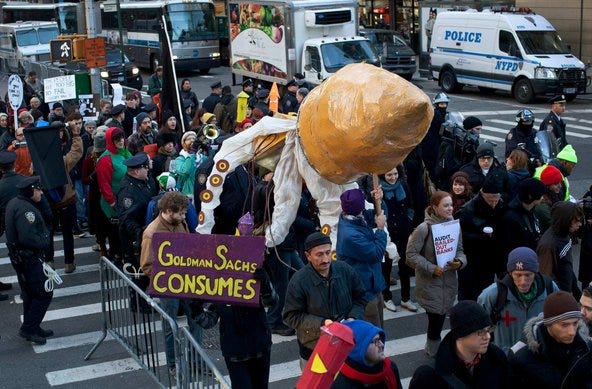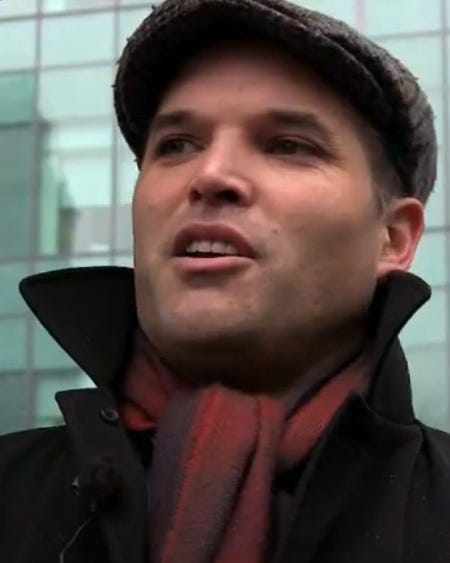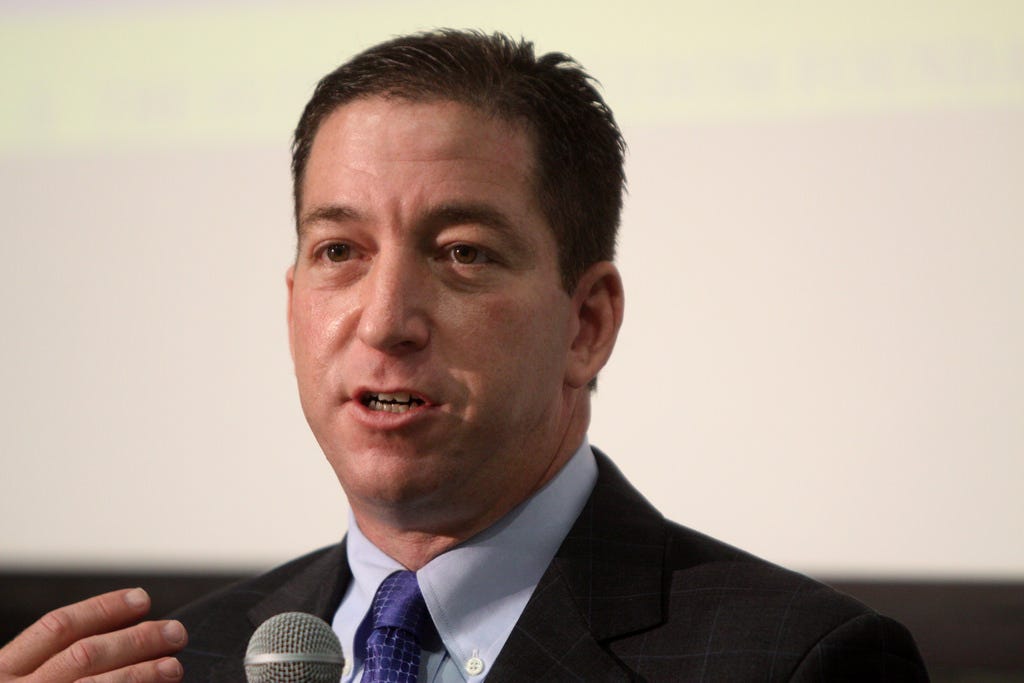Matt Taibbi's Petty Crusade Against Cancel Culture
What should have been an honest discussion has instead turned into a bizarre form of revenge porn.
(Trigger warning for explicit content)
As politically left as I am, there was a time when I was lefter still, helping to organize rallies for Occupy Wall Street and participating in demonstrations of public dissent. In a lobby of a Bank of America branch in Houston, Texas, I took part in a “divorce ceremony”, intended to be lighthearted but disruptive, that was five minutes, tops.
As you might imagine, banking institutions are notoriously lacking a sense of humor.
After exiting the building, we were beset by no fewer than twenty cop cars. They were everywhere, lights whirling, tires squealing as they tore through the parking lot. I was shocked. Clearly, we weren’t robbing the place. A murder on bank property might not have warranted such a show of law enforcement. But police response is always in direct proportion to how close you are to the money. The only reason we weren’t apprehended was because the cops had no way of differentiating us from regular customers. We walked to our respective cars and then vanished into the night.
Matt Taibbi’s reporting was a big part of the Occupy movement. He was a columnist for Rolling Stone back then, a self-described “dissolute, drug-abusing anarchist”, which made him, oddly, a perfect fit for a intentionally non-hierarchical protest movement against economic inequality and the outsized influence of money on American politics. I devoured his columns. I bought his books. Taibbi was the only non-banking journo who could explain in plain terms how a tranche was a security, like a collateralized mortgage obligation, which could be split up into smaller pieces and sold to investors. It was also one of the reasons the financial crisis of 2007-2008 even happened, since tranching made it possible to conceal bad debt inside of good.
After Taibbi rightly described Bank of America as “a great vampire squid wrapped around the face of humanity, relentlessly jamming its blood funnel into anything that smells like money”, Occupiers started brandishing papier-mâché replicas of squids at every protest.
It was brilliant.

With his devilish grin, boyish good looks, and plaid newsboy cap, Matt Taibbi became the de facto face of Occupy, and we were happy to have him. He was at his best then, helping to light not just a fire but serve as a beacon for those of us who saw great harm in dismantling the safeguards on campaign finance. The Supreme Court’s decision Citizens United v. FEC was, and is, a disaster for this country. Voters have the right to know which obscenely wealthy special interests are pouring money into all three branches of government. They don’t. “Campaign spending by corporations and other outside groups increased by nearly 900% between 2008 and 2016,” CampaignLegal.org reports. “In 2020, total election spending was $14.4 billion, up from $5.7 billion in 2018, and more than $1 billion in dark money was spent.”
Take a moment to consider the consequences of that.
By the time I made it to Manhattan’s Zuccotti Park in February of 2013, ground zero for Occupy, the authorities had effectively destroyed the movement. There was nothing left. But Taibbi’s reporting continued lighting the way, giving me hope that Occupy, like so many other mass protests, would one day rise again from its own populist ashes. In a way, it did. The more extremist wing (Occupy was always slightly conspiratorial) morphed into QAnon, which was then absorbed by preexisting white supremacist groups, many of whom converged on the nation’s capital on January 6th, 2021.
In 2014, Taibbi took a brief sabbatical from Rolling Stone to run Racket, an investigative magazine financed by eBay founder and tech-utopian billionaire Pierre Omidyar. Not much is made of this temporary exodus (eight months later, Taibbi returned to Rolling Stone), but I believe it presaged the difficulties to come.
At the offices of Omidyar’s First Look Media, whose other quasi-libertarian journalist, Glenn Greenwald, ran a sister publication called The Intercept, Taibbi endlessly sniped about hiring, seating arrangements, expense reports, and software. A female Racket staffer filed a complaint to upper management after Taibbi allegedly verbally abused her (a claim Taibbi denies). But this incident, compounded by frequent clashes with Taibbi, compelled Omidyar to strip him of his managerial responsibility, and that decision didn’t come out of nowhere.
In addition to Greenwald and Taibbi, First Look also housed other outsized personalities on the far left, people like investigative journalist Jeremy Scahill and documentary filmmaker Laura Poitras (of whistleblower Edward Snowden fame). Greenwald either left or was fired by The Intercept after echoing dubious claims made by the Trump organization regarding the 2016 election. Since then, he has become a vocal critic of the press and the political left, making almost 100 appearances on Fox News, specifically with show hosts Tucker Carlson and Laura Ingraham. Like Taibbi, it’s not a political war he’s waging so much as a personal grievance against “joyless” Democrats, the ascendency of cancel culture, the repression of free speech, and the press. Always the press.
Greenwald threw so many bitter bombs, The Intercept was forced to issue a statement about his departure: “He believes that anyone who disagrees with him is corrupt, and anyone who presumes to edit his words is a censor. Thus, the preposterous charge that The Intercept’s editors and reporters, with the lone, noble exception of Glenn Greenwald, have betrayed our mission to engage in fearless investigative journalism because we have been seduced by the lure of a Joe Biden presidency. A brief glance at the stories The Intercept has published on Biden will suffice to refute those claims.”
In 2021, Taibbi broke with Rolling Stone. Once again, the issue was about editorial control. Like Greenwald, he started his own publication on Substack (you’re reading Cappuccino on Substack, by the way). Both journalists became hugely lucrative draws, pulling in more than a million dollars annually per man.
On Substack, no one tells you what to do. And that’s the point: Greenwald and Taibbi are both famous writers who don’t like being reined in. But with that kind of celebrity comes a monstrous amount of ego. When have you ever come across a writer with a massive ego who gracefully brooked opposition or criticism?
Meanwhile, the shambolic Trump presidency had begun, and Americans, including journos, were obliged to pick sides. Taibbi didn’t like that. Moreover, part of the polemic centered around Russia’s role in undermining the 2016 election; anyone who disagreed with that narrative was labeled a Russia apologist.
Taibbi had lived and worked in Russia during the 1990s publishing a “satirical” tabloid newspaper called The eXile.
“I definitely became embittered toward mainstream colleagues during these years,” Taibbi said during an interview, “[especially colleagues] who piled on and accused me of being a secret Trumper and a Putinite and all of these things, just for not signing off on hot takes like: Trump is a literal Russian spy, Trump is clinically insane, Trump is Hitler, America is literally a fascist state, etc.”
All good arguments, if you can back them up. The trouble was Trump had been behaving exactly like a fascist, running the Justice Department and the State Department, among others, as his own private fiefdoms. He also had provable and extensive ties to the Russian government.
In 2017, Taibbi’s book, I Can’t Breathe, was released to good reviews. The story was about the death of Eric Garner, a forty-three-year-old Black man, at the hands of the New York City police department. Around that time, the press dug up old copies of The eXile, his Hunter-Thompson-meets-Alfred-E-Newman cult tabloid that he wrote while living in Russia with expat Mark Ames.
Was it satire? They claimed it was, and I’m not here to debate that. Whether it was satire, self-deprecating humor, or stupid fratty hijinks doesn’t matter. By any name, some of the tabloid’s contents were appalling.
Ames and Taibbi gloried in their depravity. They even published a memoir of their drug-fueled adventures called The Exile: Sex, Drugs, and Libel in the New Russia, recounting the way they treated Ames and Taibbi’s first business manager, an American woman named Kara:
“We’d never given her any respect or credit. We were glory hogs and obnoxious jerks. Worst of all was our sexism. Our sexism and sexual harassment of the Russian female staff, as well as the sexism in our newspaper, was too much for her. Watching us harass the young female staff had to be the most painful part—because we’d never, in a million years, have thought of harassing her.
“You know I’m not PC. But there’s a limit. You go too far. You’re always trying to force Masha and Sveta under the table to give you blow jobs. It’s not funny. They don’t think it’s funny,” Kara complained.
“But . . . it is funny,” Matt said.
“We have been pretty rough on our girls. We’d ask our Russian staff to flash their asses or breasts for us. We’d tell them that if they wanted to keep their jobs, they’d have to perform unprotected anal sex with us. Nearly every day, we asked our female staff if they approved of anal sex. That was a fixation of ours. “Can I fuck you in the ass? Huh? I mean, without a rubber? Is that okay?” It was all part of the fun. Fun that Kara was no part of.”
For the sake of argument, let’s say it was satire. But if Ames and Taibbi had written so casually about lynching Black people, how would you feel about them then? Is it still satire—or just horrific, tasteless dreck? What is your opinion of someone who at any time of their lives, no matter how young and dumb, found this kind of thing “funny”? Keep in mind, this was Russia in the 1990s—no one had any money and the country was imploding. These women were not only subjected to daily verbal assaults, they had no recourse, short of quitting, which they couldn’t afford to do. How funny do you think Taibbi’s brand of “satire” is now?
The American reading public was disgusted. Taibbi’s book tour was promptly cancelled. His publisher dropped him.
“I was strung out on heroin all those years, though that does not excuse me,” Taibbi wrote in a long abject apology. “We wrote a lot of terrible things back then, for which I feel deep regret. Since leaving Russia memories of the paper’s gratuitous viciousness, its often demeaning and misogynistic content, and its generally mean-spirited tone over the years have haunted me.”
If Taibbi had left it there, things might have eventually blown over, but he didn’t. Panicked, he started pointing fingers at his former business partner, Mark Ames, calling him an “unapologetic libertine, while I was in a committed relationship throughout that period.” He leaned heavily on the freedom-of-speech/satire angle. The more he excused himself, the more he debased himself; the more he debased himself, the more lunatic it got.
At some point, Taibbi must have realized how ridiculous he sounded. For someone who, like Greenwald, had an ego the size of a Winnebago, it must have been frightful. And yet, instead of accepting responsibility for his actions and moving on, he began pointing the finger at the political left, the #MeToo movement, and most of all at cancel culture.
“The American left has lost its mind,” Taibbi wrote on Substack. “It’s become a cowardly mob of upper-class social media addicts, Twitter Robespierres who move from discipline to discipline torching reputations and jobs with breathtaking casualness.”
And guess what?
Here’s the part that might surprise you, coming from me.
He’s not wrong.
The political left—that’s my side of the aisle—has much to atone for. The term I use is “cultural arsonism.” We have allowed the most extreme faction of our party to silence healthy debate about everything from transwomen using the ladies’ room to substituting “pregnant people” for “pregnant women.” Instead of acknowledging the enormous good a celebrity author like J.K. Rowling has done giving away half her vast fortune, we’ve burned her at the stake over comments about not wanting to see transwomen in public restrooms.
I say this as someone who admires her success but is no fangirl of her work.
For the record, I strongly disagree with Rowling. Transwomen are at far greater risk of bodily harm in the men’s room than they are in the ladies’ room. As far as a transgender person harassing a non-transgender person, spokespeople from every major civil rights organization have agreed there isn’t a single instance of this happening.
So, we shut Rowling down. We made her the villain. Instead of having a civil debate about the issue, we let transwomen (who were at one time, let’s not forget, men with all the attendant privileges and entitlements of their sex) launch a very unnuanced ad hominem attack on the author herself.
We on the left do it all the time. We cannibalize our own. Republicans, rarely.
Do we need this aggressive push from the left to raise awareness? Yes. At times, has it gone too far? Yes.
But is Taibbi justified in resenting what happened to him?
No.
Cancel culture didn’t make him write those revolting things. He did. He suffered the consequences, but failed to learn the lesson. Because make no mistake: Taibbi’s attack on cancel culture isn’t merely philosophical. It stems from the humiliation and rejection he felt and still feels.
Many of us on the left accuse Taibbi of having changed since his Occupy days. Taibbi insists it isn’t true. In a way, I agree. He’s still a bomb-thrower, but it’s where he’s aiming those bombs that’s changed. Instead of lobbing them at the fascist wing of the GOP, he’s chosen to go for the left jugular. That puts him in lockstep with Greenwald and a slew of other lefties who eventually went so far left, they turned right.
And I mourn his loss. These days, Taibbi has devoted himself to working hand-in-glove with Elon Musk to release “intel” on Hunter Biden’s laptop. That’s how far he’s fallen.
Ego is an ugly thing, especially when it gets in the way of us seeing the truth about ourselves.
And in this case, ego is destroying a once-great journalist.
Copyright © 2022 Stacey Eskelin
What are your thoughts? I want to hear them. Be sure to leave your comments in the comments section below.






Whatever happened to successful writers still clinging to their unshakeable fear of rejection? You know, that thing that kept them as balanced and humble as they were when they were still scratching for rent money? I think the best writers tend to be those who are insecure and lacking in self-confidence. There's always a degree of hunger, of fear, of wondering if we'll ever be good enough to be successful. Sure, some of us stick our heads in ovens or swallow shotguns, but the QUALITY!!
Taibbi's behavior at the 'eXile' is significantly worse than anything I had imagined. That's way more than a simple shrug and "oopsie" can excuse, especially when your response is to dig in your heels and double-down on how it is all every/any body else's fault.
I am less and less convinced that "Cancel Culture" is anything beyond a neo-fascist construct whose only purpose is to justify savage license. Rowling's TERF-dom caught me by surprise, but I'm not sure the reaction was misplaced. When someone denies the Shoah, for example, is the proper response reasoned debate? My friend Toni came up in the '60's & '70's, and there were fairly common stories (possibly apocryphal) of people going as far as self-mutilation. In the face of so many generations of abuse, torture, and murder, in the face of overwhelming countervailing evidence, is reasoned debate really reasonable? Thomas Paine once quipped something to the effect that using logic with persons' who have abandoned reason is like giving medicine to the dead.
Instead, the best I see are grease-stain hypocrites like Bill Maher sniveling because comics aren't given unlimited opportunity (and money) to spew savage bigotry and hate on platforms they can scarcely claim to have earned or deserve being given to them. In the hands of the full-bore Reichwhiners, the term "cancel culture" is a bludgeon to silence any and all criticism.
(On that account, I do like your term "cultural arsonism." "Cancel culture" is, I am convinced, irreparably lost to any form of reasoned discussion.)
Where things can, and occasionally have, gone too far (I would argue) is with matters of artistic portrayal (for example), or historical examination. People have wanted to ban Twain's "Huckleberry Finn" because he portrays racists as racists using the "n" word. People have condemned John Ford's "The Searchers" for the anti-Indian racism of the whites, missing the fact that these people *WERE* racists (John Wayne's character being the biggest one), even as one of the two heroes is himself 1/4 Native American.